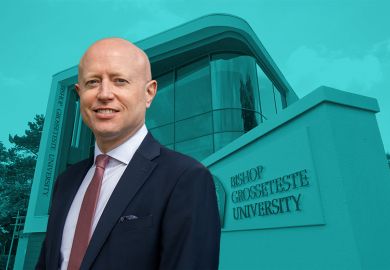The government has to answer some “tough questions” if it wants to sort out the country's teacher supply crisis.
That is the view of Chris Husbands, the new vice-chancellor of Sheffield Hallam University (SHU), who spoke to Times Higher Education on the day that the National Audit Office (NAO) published a damning report on the cost-effectiveness of the country’s initial teacher training (ITT) arrangements.
The NAO’s report found that, despite spending £700 million a year on recruiting and training teachers, the government had missed its recruitment target for the past four years.
Within the different routes, university-led teacher training continued to prove the most successful at recruiting. It was also the most affordable, with trainees costing just under £19,000 in 2013-14, in comparison with school-led routes that were about £20,000.
“We have always, in this country, been able to run our teacher training reasonably cheaply,” Professor Husbands said. “That was one of the greatest achievements of the teacher training colleges of the 19th century: to produce adequately trained teachers for elementary schools at relatively low cost."
However, he said, successive governments in recent times – dating back to Labour – had “made mistakes” in the area.
“Over the last seven or eight years, for a variety of reasons, the government has engaged in a series of experiments with teacher training, which have been relatively high cost. Teach First cost the government four times as much as mainstream routes; School Direct [was also] more expensive.
“Government has got to understand that there is a relationship between the stock supply – which you can do at relatively low cost through stable institutions running at economies of scale – [and] experimenting, which is always going to be rather more expensive.”
Professor Husbands, who took over at SHU in January, is well placed to talk about the matter. He was previously director of the UCL Institute of Education (IoE) – one of the oldest and largest teacher training providers in the country. SHU is also one of the largest ITT providers, and opened its new Sheffield Institute of Education in 2014.
“The question for government is: do you want to build your teacher education supply on an unstable framework?” he said. “What have universities, [and] teacher training colleges been really good at? Supplying relatively large numbers, of relatively well-trained people into the school system.”
Professor Husbands added that it wasn’t solely teacher training that was facing instability in the higher education sector, and that the “really big challenge” for universities was to be sure of what was their “place in the world”. Despite coming from an “upper-market, top-of-the-league-table institution” at UCL to a “mid-market, mid-table institution”, he found the “competitive challenges” very similar, he said.
“Whether it’s UCL, SHU, University of Hong Kong…how are you driving opportunity in your region, in your city?” was the key question, he said.
He accepted that despite “first-class staff” and a “financially secure” university, there was a continuing “frustration about league table position” at SHU, but stressed that this should not be a distraction to answering that core mission.
“We should not be distracted by league tables. We should focus on what we’re about. This is a Sheffield city university, it grows out of this city – opportunity, innovation and impact for this city and its region. That’s where we start,” he said.
POSTSCRIPT:
Print headline: Tough questions ahead on teacher training, says Sheffield Hallam v-c
Register to continue
Why register?
- Registration is free and only takes a moment
- Once registered, you can read 3 articles a month
- Sign up for our newsletter
Subscribe
Or subscribe for unlimited access to:
- Unlimited access to news, views, insights & reviews
- Digital editions
- Digital access to THE’s university and college rankings analysis
Already registered or a current subscriber?









